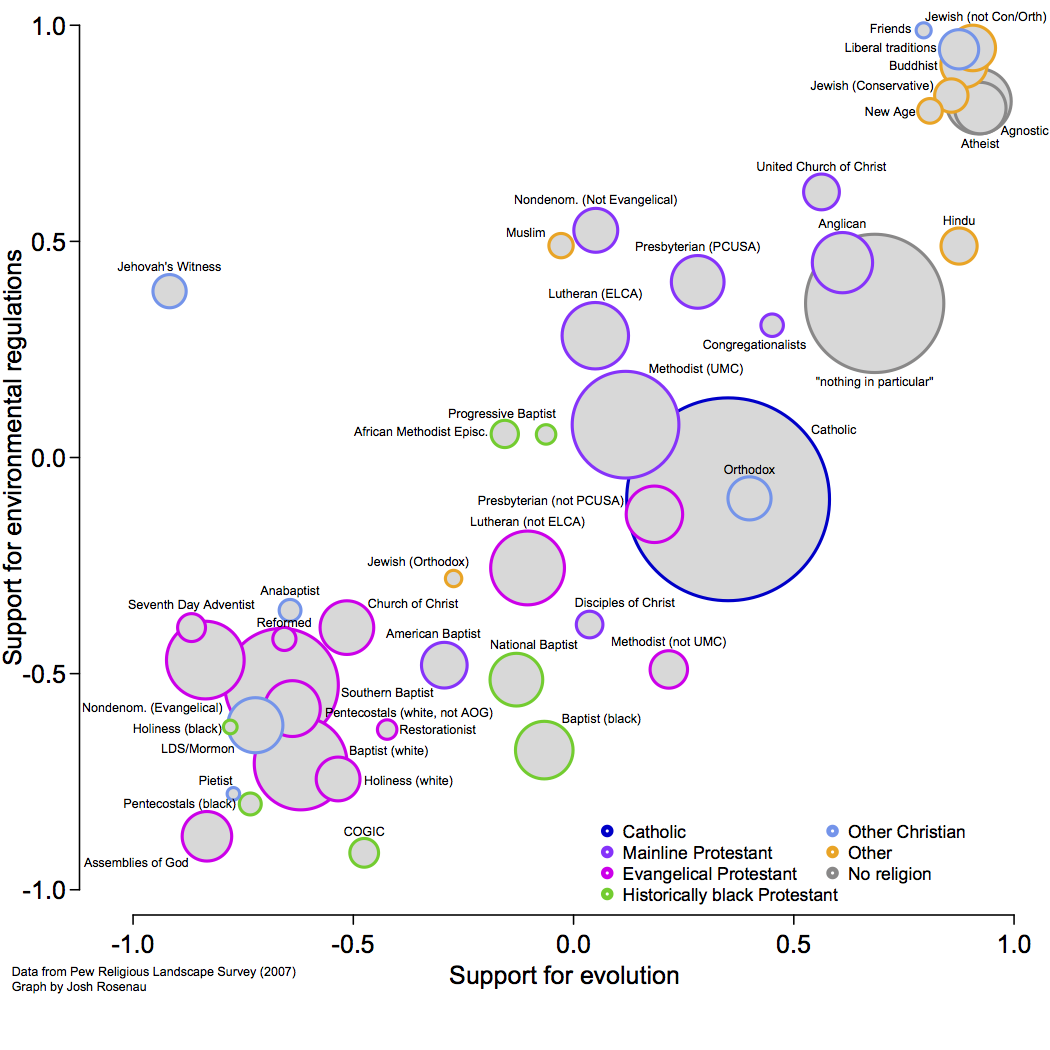 One of the first things I (and many others) noticed about the graph of various American religious groups’ views on evolution and the environment was how much of an outlier Jehovah’s Witnesses are. They are, on average, quite supportive of environmental policies, while vigorously anti-evolution. Most other denominations show a strong correlation between the two sets of attitudes.
One of the first things I (and many others) noticed about the graph of various American religious groups’ views on evolution and the environment was how much of an outlier Jehovah’s Witnesses are. They are, on average, quite supportive of environmental policies, while vigorously anti-evolution. Most other denominations show a strong correlation between the two sets of attitudes.
Explaining why they are so anti-evolution isn’t hard. Charles Taze Russell, whose Watch Tower Society reorganized after his death into the Jehovah’s Witnesses, came out against evolution early on, the church’s stance hasn’t changed, and Witnesses eschew higher education which might challenge that belief (and are notoriously resistant to dissent in general).
It turns out that the dogma is wagging the tail when it comes to climate change, too. As our own Robert Luhn described on this blog last fall, the Jehovah’s Witnesses have worked the threat of climate change into their doorway evangelism. Indeed, Charles Taze Russell included warnings about global warming and melting polar ice in his apocalyptic warnings as far back as the 1880s. A search through the Witnesses’ online archives reveals a sustained drumbeat of concern about the environment.
Reading these articles, there’s a constant tension, though. Jehovah’s Witnesses are an apocalyptic, millenarian group, originally organized around a prophecy that the world would end in the near future, and still dedicated to the proposition that we are witnesses to the last moments before the apocalypse that will usher in a divine judgment and a return to Eden for the righteous. One would think that the prospect of the Earth’s imminent rebirth might make people less concerned about preserving it for future generations.
They address that issue in a 2005 essay, “Why Care for Earth’s Environment?”. They acknowledge the tension, observing: “The Bible assures us that every trace of the damage caused by man will be undone when God ‘makes all things new.’ (Revelation 21:5)” But they add: “However, we should not conclude that since God will in time restore the earth, our actions now do not matter. They do! How can we demonstrate that we share God’s view of our planet and support his will for it to be a paradise?”
Some may view the unlimited consumption of energy or other resources as their right. But natural resources should not be squandered simply because we can afford them or there is an abundance. After Jesus miraculously fed a large crowd, he directed that the remaining fish and bread be gathered. (John 6:12) He was careful not to waste what his Father had provided. …
The Creator placed upon humans the responsibility to care for the earth. Appreciation for this assignment and humble respect for God and his creative works should motivate us to make thoughtful, conscientious decisions regarding how we treat the earth.
Whether or not this strikes you or me as a compelling argument, it is the official stance of a church that takes official stances very seriously, and punishes dissent vigorously. As such, Witnesses are notably creationist and apparently committed to environmental stewardship. Go figure.

